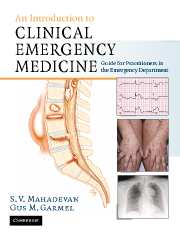Book contents
- Frontmatter
- Contents
- List of contributors
- Foreword
- Acknowledgments
- Dedication
- Section 1 Principles of Emergency Medicine
- Section 2 Primary Complaints
- 9 Abdominal pain
- 10 Abnormal behavior
- 11 Allergic reactions and anaphylactic syndromes
- 12 Altered mental status
- 13 Chest pain
- 14 Constipation
- 15 Crying and irritability
- 16 Diabetes-related emergencies
- 17 Diarrhea
- 18 Dizziness and vertigo
- 19 Ear pain, nosebleed and throat pain (ENT)
- 20 Extremity trauma
- 21 Eye pain, redness and visual loss
- 22 Fever in adults
- 23 Fever in children
- 24 Gastrointestinal bleeding
- 25 Headache
- 26 Hypertensive urgencies and emergencies
- 27 Joint pain
- 28 Low back pain
- 29 Pelvic pain
- 30 Rash
- 31 Scrotal pain
- 32 Seizures
- 33 Shortness of breath in adults
- 34 Shortness of breath in children
- 35 Syncope
- 36 Toxicologic emergencies
- 37 Urinary-related complaints
- 38 Vaginal bleeding
- 39 Vomiting
- 40 Weakness
- Section 3 Unique Issues in Emergency Medicine
- Section 4 Appendices
- Index
17 - Diarrhea
Published online by Cambridge University Press: 27 October 2009
- Frontmatter
- Contents
- List of contributors
- Foreword
- Acknowledgments
- Dedication
- Section 1 Principles of Emergency Medicine
- Section 2 Primary Complaints
- 9 Abdominal pain
- 10 Abnormal behavior
- 11 Allergic reactions and anaphylactic syndromes
- 12 Altered mental status
- 13 Chest pain
- 14 Constipation
- 15 Crying and irritability
- 16 Diabetes-related emergencies
- 17 Diarrhea
- 18 Dizziness and vertigo
- 19 Ear pain, nosebleed and throat pain (ENT)
- 20 Extremity trauma
- 21 Eye pain, redness and visual loss
- 22 Fever in adults
- 23 Fever in children
- 24 Gastrointestinal bleeding
- 25 Headache
- 26 Hypertensive urgencies and emergencies
- 27 Joint pain
- 28 Low back pain
- 29 Pelvic pain
- 30 Rash
- 31 Scrotal pain
- 32 Seizures
- 33 Shortness of breath in adults
- 34 Shortness of breath in children
- 35 Syncope
- 36 Toxicologic emergencies
- 37 Urinary-related complaints
- 38 Vaginal bleeding
- 39 Vomiting
- 40 Weakness
- Section 3 Unique Issues in Emergency Medicine
- Section 4 Appendices
- Index
Summary
Scope of the problem
There are estimated to be over 100 million cases of acute diarrhea in adults in the US each year. Diarrhea accounts for approximately 5% of emergency department (ED) visits. This complaint is even more common in children <3 years of age. Worldwide, diarrheal illnesses affect 3 to 5 billion people a year, accounting for over 5 to 10 million deaths in developing countries. Etiologies range from benign conditions such as viral gastroenteritis to life-threatening invasive diarrheal illnesses. The most common causes of acute diarrhea are infectious agents.
Pathophysiology
Diarrhea is defined as the rapid passage of excessively fluid stool, passing stool that takes form of the container rather than remaining in its natural form, or frequency of stool greater than three times a day. The gastrointestinal (GI) tract resorbs over 9 liters of fluid a day (the majority by the small intestine), leaving approximately 100ml/day excreted in stool. Alteration in this process may lead to diarrhea. This can occur from an increase in the volume load presented to the GI tract, diminished ability to resorb fluids by the bowel, inflammatory processes, or an increase in gut motility.
Osmotic diarrhea occurs when unabsorbable or poorly absorbable molecules such as lactulose and laxatives challenge the small intestine. Inflammatory diarrhea occurs with inflammation of bowel mucosa, which limits its ability to resorb fluid. This can occur with numerous agents, for example Shigella and Giardia.
- Type
- Chapter
- Information
- An Introduction to Clinical Emergency MedicineGuide for Practitioners in the Emergency Department, pp. 233 - 240Publisher: Cambridge University PressPrint publication year: 2005



